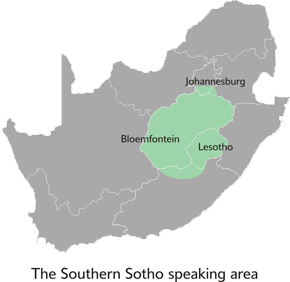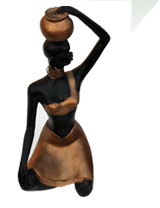Southern Sotho:
|
 |
||||||||||
The Sotho languages are related closely enough to be understood by all speakers of this group. More or less 25% of South Africans speak a Sotho language at home. According to a recent survey, Northern Sotho is spoken by 3.8 million people.
Northern Sotho (Sesotho sa Leboa) is the collective term for a variety of dialects which are found in Gauteng, Mpumalanga, North West Province and Limpopo. The dialects of Northern Sotho can roughly be divided into the following three groups according to their location and mutual solidarity:
(i) Dialects such as Sepedi, Sekopa, Sekone and Setau, which are found to the south of Polokwane.
(ii) Dialects such as Setlokwa, Sehananwa and sa GaMatlala, which are found to the north of Polokwane.
(iii) Dialects such as SePhalaborwa, Selobedu/Khelovedu and Sekhaga, which are spoken to the east of Polokwane.
Some differences occur between these dialects - in actual fact, the differences between the dialects to the north and south of Polokwane are probably just as many as the differences between these dialects and Tswana or Southern Sotho. However, these differences are usually limited to differences in pronunciation, although different words are sometimes used to express the same meaning.
Northern Sotho is based mainly on the Sepedi dialect of Sekhukhuneland. This is due to the activities of German missionaries in this area, whose work led to the publishing of the Bible in Sepedi. Later on, the written language of that time was used more widely, with other dialects also contributing to its development. Presently, we have a standardised Northern Sotho, which is still based on Sepedi, but which also reflects influences of other dialects. Some people still refer to Northern Sotho as Sepedi but, since not all speakers of this language like to use this term, it is the safest to refer to it as ‘Sesotho sa Leboa’. (Cf. Government Gazette 22223 of 21 April 2001.)



